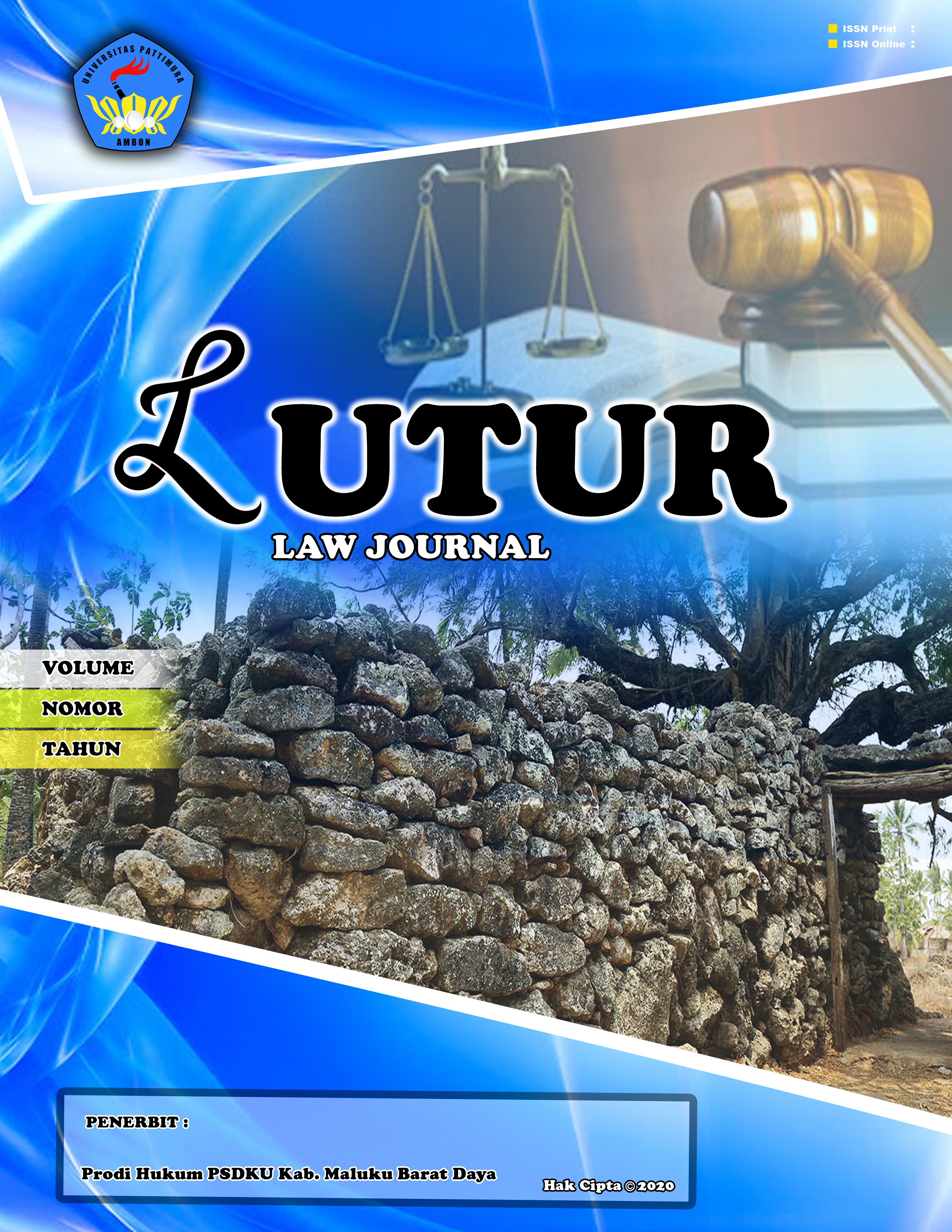Legal Protection of Land Rights Ownership Through the Rechtsverwerking Institution
Abstract
Disputes related to land always increase in number to cause many cases, one of which is the ownership of land rights through the concept of rechtsverwerking (Releasing Rights) who have obtained a certificate of land rights, even though the provisions of laws and regulations and in several Supreme Court Jurisprudence have accommodated it, but the party who obtains land rights through the concept in question has not received legal protection against The application of the concept. The research method used in writing this thesis The author uses a normative juridical research method with an analytical descriptive research type of laws and regulations and uses primary, secondary and tertiary sources of legal materials through the procedure of collecting legal materials and analyzing legal materials to obtain conclusions. The results of the study found that the principle of good faith in the ownership of land rights through the concept of rechtsverwerking can be applied to the possession of land by the party who controls the land for a reasonable period of time in a real way with good etiquette, then the person concerned can register it to obtain a certificate of ownership more than 5 (Five) years after it was issued, then the previous owner cannot file an objection and/or claim his rights again, because based on the concept of rechtsverwerking the person concerned is considered to have relinquished his rights or relinquished his rights thus his rights are lost and/or deleted, therefore the ownership of land rights through the concept of rechtsverwerking must receive legal protection. The form of legal protection for the ownership of land rights based on the concept of rechtsverwerking cannot be separated from the issue of justice in the implementation of the law itself. Protection for land rights holders based on rechtsverwerking institutions in the form of preventive protection and repressive protection.
Downloads
References
A P Parlindungan, Pendaftaran Tanah di Indonesia, Bandung: Mandar Maju, 1999.
Annisa Aulia dan I Made Auliana. Perlindungan Hukum Bagi Pemegang Sah Hak Atas Tanah Dengan Adanya Sertifikat Ganda Hak Atas Tanah. https://ojs.unud.ac.id/index.php/kerthasemaya/article/download/20548/13484/
Andrian Sutendi, Peralihan Hak atas Tanah, Jakarta: Sinar Grafika, 2007.
Beta, S. P.“Perbandingan Sistem Peralihan Hak Milik Menurut KUHPerdata Dan UndangUndang Pokok Agraria No. 5 Tahun 1960” Jurnal Lex Privatum 7, no. 5 (2020).
Boedi Harsono, Hukum Agraria Indonesia. Sejarah Pembentukan Undang-Undang Pokok Agraria, Isi dan Pelaksanaannya, Bandung: Penerbit Jembatan, 1997.
Desi Apriani dan Arifin Bur, “Kepastian Hukum dan Perlindungan Hukum dalam Sistem Publikasi Pendaftaran Tanah di Indonesia”, Jurnal Bina Mulia Hukum 5, no. 2 (2021): 227, https://doi.org/10.23920/jbmh.v5i2. 11.
Erna Sri Wibawanti dan R. Murjiyanto, Hak-hak Atas Tanah dan Peralihannya, Yogyakarta: Liberty, 2013.
Harsono Boedi, Menuju Penyempurnaan Hukum Tanah Nasional, Jakarta: Universitas Trisakt, 2007.
I Lutfi Nasution, Sambutan Ka. BPN pada Seminar Tentang Efektivitas Lembaga “Rechtsverwerking” Dalam Mengatasi Kelemahan Sistem Publikasi Pendaftaran Tanah Negatif, Pusat Studi Hukum Agraria Universitas Trisakti, 2002.
Irawan Soerodjo, Kepastian Hukum Hak Atas Tanah di Indonesia. Surabaya: Arkola, 2002.
J. Satrio, Pelepasan Hak, Pembebasan Hutang, dan Merelakan Hak (Rechtsverwerking),Jakarta: RajaGrafindo Persada, 2016.
Muhammad Arba, Hukum Agraria Indonesia, Jakarta: Sinar Grafika, 2008.
Muh Nabil Falaq, Pengaturan Perlindungan Hukum Bagi Pemegang Hak Atas Tanah Terhadap Pemberlakuan Rechtsverwerking, Skripsi: Fakultas Hukum Universitas Muslim Indonesia, Makassar. 2023.
Nurhasan Ismail. “Rechtsverwerkin dan Pengadopsiannya Dalam Hukum Tanah Nasional”. Jurnal Mimbar Hukum 19, no. 2 (2007).
Retno Nurul Yaumi, Penerapan Asas Rechtsverwerking Dalam Perolehan Hak Milik Atas Tanah (Studi Putusan Pengadilan Di Sumatera Barat), Tesis: Program Studi Magister Kenotariatan Fakultas Hukum Universitas Andalas Padang 2024.
Rini Ardiyanti. Perlindungan Hukum Bagi Pemegang Hak Atas Tanah Terhadap Pemberlakuan Asas Rechtsverwerking (Pelepasan Hak). Skripsi: Universitas Hasanuddin. 2014.
Satjipto Rahardjo, Ilmu Hukum, Bandung: Citra Aditya Bakti, 2000.
Saptosih Ismiati, KDRT dan HAM, Yogyakarta: Deepublish, 2010.
Sri Hajati, et al, Politik Hukum Pertanahan Indonesia, Jakarta: Prenada Media. 2021.
Sutedi, A. Peralihan Hak atas Tanah Dan Pendaftarannya. Jakarta: Sinar Grafika. 2006.
Tri Prasetyo Wahyu, et. al. Konsep Rechtsverwerking Dalam Putusan Pengadilan.https://cfpmknuns.com/wp-content/uploads/ 2020/04/ TRI-Prastyo Wahyu Santoso.Pdf. 2015.
Widodo Dwi Putro, et. al. Penjelasan Hukum : Pembeli Beritikad Baik Dalam Sengketa Perdata Berobyek Tanah. Jakarta: LeIP, 2008.
Yunastiti Purwaningsih. "Ketahanan Pangan: Situasi, Permasalahan, Kebijakan, dan Pemberdayaan Masyarakat." Jurnal Ekonomi Pembangunan 9, no. 1 (2008): 1-27.
Copyright (c) 2025 Kim Ahlam, Adonia Ivone Laturettte, Pieter Radjawane (Author)

This work is licensed under a Creative Commons Attribution-NonCommercial 4.0 International License.
Authors who publish their manuscripts in this Journal agree to the following conditions:
- The copyright in each article belongs to the author, as well as the right to patent.
- Authors are able to enter into separate, additional contractual arrangements for the non-exclusive distribution of the journal's published version of the work (e.g., post it to an institutional repository or publish it in a book), with an acknowledgment of its initial publication in this journal.
- Authors are permitted and encouraged to post their work online (e.g., in institutional repositories or on their website) prior to and during the submission process, as it can lead to productive exchanges, as well as earlier and greater citation of published work.
- Authors have the right to self-archiving of the article (Author Self-Archiving Policy)














